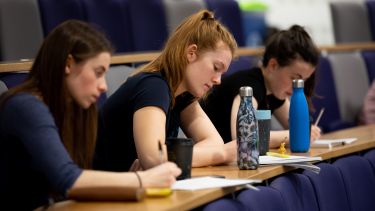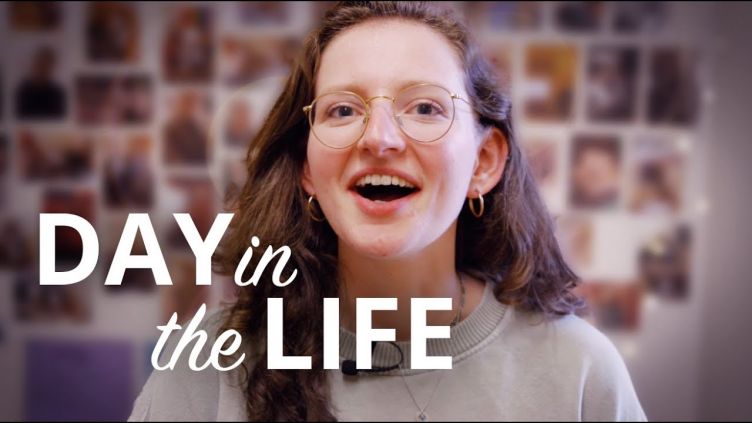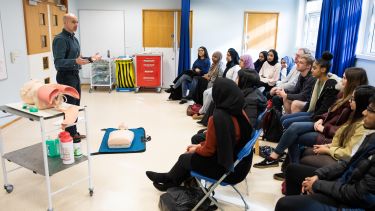Key details
- A Levels AAA
Other entry requirements - UCAS code A100
- 5 years / Full-time
- September start
- Find out the course fee
- Industry placement
Course description

Based on a patient-centred approach, the course is designed around common and important clinical conditions. It relates clinical medicine to the underlying medical sciences. You’ll have the opportunity to develop your clinical competencies from the very start.
The course includes clinical teaching on wards in hospitals, clinics (both in general practice and in hospitals), lectures, seminars, tutorials, small group work, dissection and personal development supported by experienced teachers and personal academic tutors. We aim to ensure you’re well prepared for a career in medicine.
The medical course at Sheffield offers a broadly-based but extensive education and training incorporating the recommendations of the General Medical Council’s report Outcomes for Graduates. The course leads to the professional qualification of Bachelor of Medicine and Bachelor of Surgery (MBChB).
Our MBChB programme has been designed to educate and train you so that you will become a doctor equipped with the clinical abilities, knowledge, attitudes and professional behaviours needed to become a junior hospital doctor. This preparation will also prepare you for your continued professional development after graduation.
Course aims and philosophy
Course aimsA patient-centred approach
Developing clinical skills
Clinically led learningCourse themes
Accreditation and obtaining your license
Primary medical qualification (PMQ)Medical licensing assessment (MLA)Foundation year oneFull registration

Modules
The modules listed below are examples from the last academic year. There may be some changes before you start your course. For the very latest module information, check with the department directly.
Choose a year to see modules for a level of study:Phase 1 Phase 2 Phase 3 Phase 4
September Year 1 to June Year 1
Introductory Clinical Competency
- Introduction to Medical Studies and Medical Sciences
- Introductory clinical competencies
- Systems based learning and teaching (Cardiovascular, Respiratory, Gastrointestinal and Liver, Musculo-skeletal, Skin, Nervous, Genitourinary, Endocrine, Reproductive, Haematology, Immunology)
- Integrated Clinical Demonstrations
- Multi Professional Experience (a 2-week hospital-based placement)
- Early Years General Practice Placement (10 half-days through year 1)
- Community Attachment Scheme
- Public Health and Population Health Science
- Medical Ethics
- Personal and Professional Development
- Student Selected Components (SSCs)
The structure of Phase 1 follows the General Medical Council’s (GMC) Guidelines and is largely ‘systems-based’. Information is presented in a series of modules which cover the basic systems of the body and also involves Public Health and Population Health Science, Medical Ethics, Professionalism and Patient Safety and Student Selected Components.
Much of the teaching takes place in the Medical School which is sited next to the Royal Hallamshire Hospital. A significant part of Phase 1 involves working outside the main campus, for example at the clinical skills units at the Northern General Hospital and the Royal Hallamshire Hospital, on the wards of nearby hospitals or within a community setting including general practice and some social service locations.
Phase 1 includes a two-week hospital-based Multi Professional Experience (MPE), which introduces you to working on the ward with doctors, nurses and other healthcare professionals. Students also have ten regular placements in a General Practice throughout the first year, starting in week 2 of the first term.
Phase 1 focuses on the normal structure and function of the human body. Whilst it is obviously important to cover subject disciplines such as Anatomy (including embryology and histology), Physiology and Biochemistry, these are presented in an integrated way within the relevant body system under study.
For example, in the cardiovascular system module, the structure, function and metabolism of the heart will be studied. In addition, aspects of Public Health, Ethics and other relevant topics are integrated into the course with a Public Health/Population Health Sciences module that runs longitudinally throughout the year.
Learning is by practical classes (including dissection of the human body), lectures, flipped classrooms, tutorials and self-directed study. Computer-based learning is used routinely within Phase 1 and student evaluations of these packages show that they are very well received.
Students complete summative pieces of coursework during Phase 1, which develops generic graduate skills. These student selected components focus on the history of medicine, critical analysis and communicating health information. The first of these is launched in the first week.
Formal assessment in Phase 1 consists of a written examination paper (multiple- choice and clinically related ‘scenario-based short answer’ questions) and a practical examination. The whole examination must be passed before progression to the next stage. However if a student fails there is an opportunity to resit the examination during the summer vacation period.
The content of our courses is reviewed annually to make sure it’s up-to-date and relevant. Individual modules are occasionally updated or withdrawn. This is in response to discoveries through our world-leading research; funding changes; professional accreditation requirements; student or employer feedback; outcomes of reviews; and variations in staff or student numbers. In the event of any change we’ll consult and inform students in good time and take reasonable steps to minimise disruption. We are no longer offering unrestricted module choice. If your course included unrestricted modules, your department will provide a list of modules from their own and other subject areas that you can choose from.
Learning and assessment
Learning
You will learn through clinical teaching on wards in hospitals, clinics (both in general practice and in hospitals), lectures, seminars, tutorials, small group work, dissection and personal development supported by experienced teachers and personal academic tutors. We aim to ensure you’re well prepared for a career in medicine.
We invest to create the right environment for you. That means outstanding facilities, study spaces and support, including 24/7 online access to our online library service.
Study spaces and computers are available to offer you choice and flexibility for your study. Our five library sites give you access to over 1.3 million books and periodicals. You can access your library account and our rich digital collections from anywhere on or off campus. Other library services include study skills training to improve your grades, and tailored advice from experts in your subject.
Learning support facilities and library opening hours
Assessment
You will be assessed by exams, coursework and practical tasks.
Programme specification
This tells you the aims and learning outcomes of this course and how these will be achieved and assessed.
Find programme specification for this course
Entry requirements
Summary of entry requirements
Please ensure you also read the more detailed entry requirements below.
With Access Sheffield, you could qualify for additional consideration or an alternative offer – find out if you’re eligibleStandard offerAccess Sheffield offer
The A Level entry requirements for this course are:
AAA
including Chemistry or Biology and a second science
A Levels + additional qualifications | AAB, including Chemistry or Biology (at grade A) and a second science + A in a relevant EPQ taken alongside A Levels
International Baccalaureate | 36, with 6 in three Higher Level subjects to include Chemistry or Biology and a second science. No less than 4 in all Standard Level subjects
BTEC | Not accepted
Scottish Highers + 2 Advanced Highers | AAAAB + AA in Chemistry or Biology and a second science
Welsh Baccalaureate + 2 A Levels | A + AA in Chemistry or Biology and a second science
Access to HE Diploma | Not accepted
Mature students – explore other routes for mature studentsEnglish language requirements |
You must demonstrate that your English is good enough for you to successfully complete your course. For this course we require: GCSE English Language at grade 4/C; IELTS grade of 7.5 with a minimum of 7.0 in each component; or an alternative acceptable English language qualification
Equivalent English language qualifications
Visa and immigration requirementsOther requirements
- Second science subjects include Chemistry, Biology/Human Biology, Maths, Physics or Psychology
- We do not accept A Level Further Maths when determining whether an applicant meets our A Level academic threshold. However, for applicants who take four A Levels in a two year period (typically years 12 and 13 at school) including Maths and Further Maths, we will accept the Maths A Level, even if it is taken in Year 12, and irrespective of whether the A Level is certificated in Year 12 or 13. It is expected that Chemistry or Biology and a third acceptable subject will be taken in Year 13
- First degree requirements: 2:1 or higher + BBB at A Level
- 5 GCSE grades at 7/A, including at least grade 6/B in Maths, English Language and the science subjects (dual-science awards acceptable)
- All applicants must have taken the UCAT and the minimum threshold required will be published on the Medical School’s admissions webpages. Applicants will be ranked on their UCAT score
More detailed entry requirements
The majority of applicants in 2020-21 met the minimum academic and University Clinical Aptitude Test (UCAT) requirements. Those applications that did not meet the minimum entry criteria were deemed unsuccessful.
As our selection procedure takes into account academic achievements, applicants will be assessed on the results (achieved and/or predicted) of all of their qualifications. Due to the competitive nature of applying for the course most candidates selected to attend a Multiple Mini-Interview usually far exceed our minimum requirements. Meeting the minimum academic and UCAT entry requirements does not guarantee an invitation to interview or the offer of a place.University Clinical Aptitude Test (UCAT)GCSE requirementsEnglish language requirementsAS Level requirementsA Level requirementsApplicants offering A Levels and an Extended Project Qualification (EPQ)Other qualificationsHigher level qualificationsInternational qualificationsDisrupted StudiesDisclosure and Barring Service checkHealth requirementsAdmissions policy download
We also accept a range of other UK qualifications and other EU/international qualifications.
If you have any questions about entry requirements, please contact the department.
The Medical School

The Medical School at Sheffield integrates teaching, research and the practice of medicine. Our teaching is supported by internationally recognised research.
You’ll go out to primary and secondary care providers in the region, learning about best current practice. You will be part of an academic, clinical and scientific community.
Our Clinical Skills Centre is based at the Northern General Hospital, one of the largest hospitals in the country. The centre contains mock clinical wards, resuscitation suites, simulated theatres and teaching rooms – a perfect facility for training the healthcare professionals of tomorrow.
Facilities
Our Clinical Skills Centre is based at the Northern General Hospital, one of the largest hospitals in the country. The centre contains mock clinical wards, resuscitation suites, simulated theatres and teaching rooms – a perfect facility for training the healthcare professionals of tomorrow.
Leave a Reply